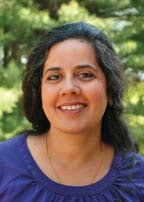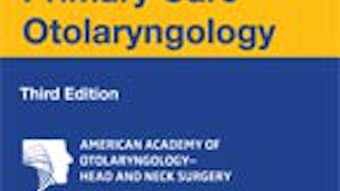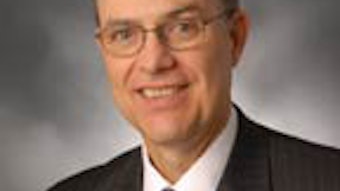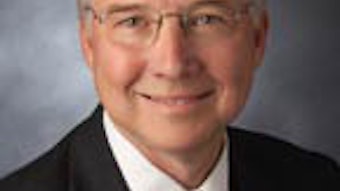BOG Tackles the Tough Issues in Healthcare Spending
We live, and practice, in interesting times. As I assume the role of Chair of the Board of Governors, following an intense learning year shadowing Michael D. Seidman, MD, I look back at the efforts and accomplishments of the BOG’s socioeconomic and grassroots initiatives. I also look ahead to the challenges for 2011-2012. Healthcare spending encompasses 16 percent of our nation’s Gross Domestic Product (GDP). Therefore, as we follow state and national political discourse, it is naïve to think that our profession—one-sixth of our nation’s expenditure—will not be affected. Even though ENT makes up a fraction of the house of medicine, our Academy’s voice has been a loud one in reminding our elected officials what is real in medical care. During this summer’s heated debt crisis discussions, only one plan included reforming or replacing the untenable and flawed sustainable growth rate (SGR) formula—at a cost of $298 billion over 10 years. This was to be offset by undefined savings in federal healthcare programs, suggesting that physicians might have ended up paying for the “doc fix” via lower reimbursement. That plan didn’t go through. The debt deal that was reached did not eliminate the SGR and instead created a new level of uncertainty for physician payments. The debt deal charges a newly created Joint Select Committee on Deficit Reduction (a.k.a., the Super Committee) with identifying $1.2 trillion in savings by November 23, 2011. If the committee fails to achieve the required savings, a trigger for automatic Medicare cuts will go into effect - a process that insulates beneficiaries and could result in a maximum 2 percent cut in physician payments from 2013 – 2021. With no SGR reform in sight, physicians face a whopping 29.5-percent decrease in Medicare payments on January 1, 2012. Our Academy has fought each prior SGR-based planned payment cut and will fight this one. It is imperative that each practicing otolaryngologist takes this “opportunity” to educate our patients and their families about the flawed SGR and the need for its repeal. Every insurance company bases its fee schedules on Medicare; a cut in Medicare means a cut in all. It has been a year and a half since the Patient Protection and Affordable Care Act (ACA), or Healthcare Reform (HCR), became law. ACA’s rollout is planned over several years. The initial phase involved expanding coverage to adult children and eliminating pre-existing condition exemptions. One portion of ACA to which AAO-HNS is adamantly opposed is the Independent Payment Advisory Board (IPAB), which would effectively be able to set physicians’ pay without the checks and balances currently in place for MedPAC. ACA also has only minimal mention of tort reform. We will continue to push at the national and state levels for fair reform of the current torts process. The Congressional Budget Office (CBO) cites the pressing need for Comparative Effectiveness Research (CER) in guiding payment decisions by the Centers for Medicare and Medicaid Services (CMS). Our Academy has been at the forefront in designing, implementing, and fine-tuning Guidelines Panels on a variety of otolaryngology topics. The goal of these panels is to provide the best CER to help physicians, patients, and payers. BOG members are welcome to participate in this process, either as panelists or as reviewers. How can you, as an otolaryngologist, make a difference? There are many ways. Attend the BOG Spring Meeting in Alexandria, VA, in 2012 and every year. You can discuss these and other pressing BOG issues in depth. In this venue, each voice is heard. We top it all off by “storming” Capitol Hill and meeting our legislators and their staff, as we emphasize our messages for improved healthcare for all. Please mark your calendars to attend Sunday, May 6, through Tuesday, May 8, 2012. Contribute* to our ENT PAC at www.entnet.org/entpac. Our PAC is guided by our needs as otolaryngologists and is party-blind. With the funds raised by the PAC, our legislative staffers are able to gain direct access to lawmakers and keep their fingers “on the pulse” of upcoming and ongoing legislation that affects ENTs. Download the Legislative and Political Grassroots Advocacy Handbook and Toolkit, linked at www.entnet.org/Community/public/BOG_SocietyResource.cfm. Join the ENT Advocacy Network at www.entnet.org/Practice/members/entAdvocacyNetwork.cfm. Read the Grassroots Media and Public Relations Handbook, linked at http://www.entnet.org/Community/outreach.cfm, and join the Media Experts Database by sending your information to newsroom@entnet.org. Attend the Fall BOG meeting in conjunction with the Foundation’s Annual Meeting & OTO EXPO. The committee meetings are on the Saturday before the annual meeting starts, and the General Assembly meeting is the Monday evening of the annual meeting. Contact us. Send your ideas, questions, thoughts to bog@entnet.org. I look forward to working with you and for you in this upcoming year. *Contributions to ENT PAC are not deductible as charitable contributions for federal income tax purposes. Contributions are voluntary, and all members of the American Academy of Otolaryngology-Head and Neck Surgery have the right to refuse to contribute without reprisal. Federal law prohibits ENT PAC from accepting contributions from foreign nationals. By law, if your contributions are made using a personal check or credit card, ENT PAC may use your contribution only to support candidates in federal elections. All corporate contributions to ENT PAC will be used for educational and administrative fees of ENT PAC, and other activities permissible under federal law. Federal law requires ENT PAC to use its best efforts to collect and report the name, mailing address, occupation, and the name of the employer of individuals whose contributions exceed $200 in a calendar year.

As I assume the role of Chair of the Board of Governors, following an intense learning year shadowing Michael D. Seidman, MD, I look back at the efforts and accomplishments of the BOG’s socioeconomic and grassroots initiatives. I also look ahead to the challenges for 2011-2012.
Healthcare spending encompasses 16 percent of our nation’s Gross Domestic Product (GDP). Therefore, as we follow state and national political discourse, it is naïve to think that our profession—one-sixth of our nation’s expenditure—will not be affected. Even though ENT makes up a fraction of the house of medicine, our Academy’s voice has been a loud one in reminding our elected officials what is real in medical care.
During this summer’s heated debt crisis discussions, only one plan included reforming or replacing the untenable and flawed sustainable growth rate (SGR) formula—at a cost of $298 billion over 10 years. This was to be offset by undefined savings in federal healthcare programs, suggesting that physicians might have ended up paying for the “doc fix” via lower reimbursement. That plan didn’t go through. The debt deal that was reached did not eliminate the SGR and instead created a new level of uncertainty for physician payments. The debt deal charges a newly created Joint Select Committee on Deficit Reduction (a.k.a., the Super Committee) with identifying $1.2 trillion in savings by November 23, 2011. If the committee fails to achieve the required savings, a trigger for automatic Medicare cuts will go into effect - a process that insulates beneficiaries and could result in a maximum 2 percent cut in physician payments from 2013 – 2021.
With no SGR reform in sight, physicians face a whopping 29.5-percent decrease in Medicare payments on January 1, 2012. Our Academy has fought each prior SGR-based planned payment cut and will fight this one. It is imperative that each practicing otolaryngologist takes this “opportunity” to educate our patients and their families about the flawed SGR and the need for its repeal. Every insurance company bases its fee schedules on Medicare; a cut in Medicare means a cut in all.
It has been a year and a half since the Patient Protection and Affordable Care Act (ACA), or Healthcare Reform (HCR), became law. ACA’s rollout is planned over several years. The initial phase involved expanding coverage to adult children and eliminating pre-existing condition exemptions. One portion of ACA to which AAO-HNS is adamantly opposed is the Independent Payment Advisory Board (IPAB), which would effectively be able to set physicians’ pay without the checks and balances currently in place for MedPAC. ACA also has only minimal mention of tort reform. We will continue to push at the national and state levels for fair reform of the current torts process.
The Congressional Budget Office (CBO) cites the pressing need for Comparative Effectiveness Research (CER) in guiding payment decisions by the Centers for Medicare and Medicaid Services (CMS). Our Academy has been at the forefront in designing, implementing, and fine-tuning Guidelines Panels on a variety of otolaryngology topics. The goal of these panels is to provide the best CER to help physicians, patients, and payers. BOG members are welcome to participate in this process, either as panelists or as reviewers.
How can you, as an otolaryngologist, make a difference? There are many ways.
- Attend the BOG Spring Meeting in Alexandria, VA, in 2012 and every year. You can discuss these and other pressing BOG issues in depth. In this venue, each voice is heard. We top it all off by “storming” Capitol Hill and meeting our legislators and their staff, as we emphasize our messages for improved healthcare for all. Please mark your calendars to attend Sunday, May 6, through Tuesday, May 8, 2012.
- Contribute* to our ENT PAC at www.entnet.org/entpac. Our PAC is guided by our needs as otolaryngologists and is party-blind. With the funds raised by the PAC, our legislative staffers are able to gain direct access to lawmakers and keep their fingers “on the pulse” of upcoming and ongoing legislation that affects ENTs.
- Download the Legislative and Political Grassroots Advocacy Handbook and Toolkit, linked at www.entnet.org/Community/public/BOG_SocietyResource.cfm. Join the ENT Advocacy Network at www.entnet.org/Practice/members/entAdvocacyNetwork.cfm. Read the Grassroots Media and Public Relations Handbook, linked at http://www.entnet.org/Community/outreach.cfm, and join the Media Experts Database by sending your information to newsroom@entnet.org.
- Attend the Fall BOG meeting in conjunction with the Foundation’s Annual Meeting & OTO EXPO. The committee meetings are on the Saturday before the annual meeting starts, and the General Assembly meeting is the Monday evening of the annual meeting.
Contact us. Send your ideas, questions, thoughts to bog@entnet.org.
I look forward to working with you and for you in this upcoming year.
*Contributions to ENT PAC are not deductible as charitable contributions for federal income tax purposes. Contributions are voluntary, and all members of the American Academy of Otolaryngology-Head and Neck Surgery have the right to refuse to contribute without reprisal. Federal law prohibits ENT PAC from accepting contributions from foreign nationals. By law, if your contributions are made using a personal check or credit card, ENT PAC may use your contribution only to support candidates in federal elections. All corporate contributions to ENT PAC will be used for educational and administrative fees of ENT PAC, and other activities permissible under federal law. Federal law requires ENT PAC to use its best efforts to collect and report the name, mailing address, occupation, and the name of the employer of individuals whose contributions exceed $200 in a calendar year.


